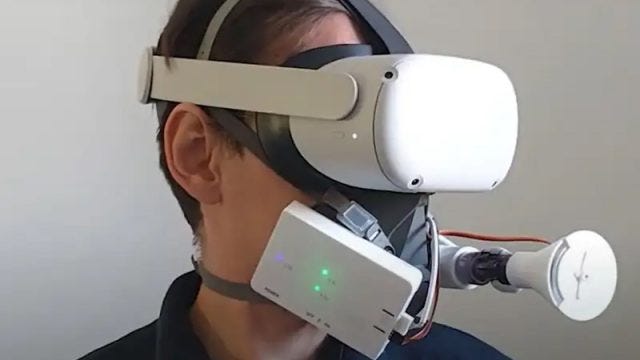AGI: How Soon Is Now?
Artificial General Intelligence is either here today or decades years away. Let's check in on the debate.
DeepMind’s Gato AI in action.
Just how close are we to building an AI that is equivalent to the human mind? One reason I started Machined was to answer that question. This week, I heard two answers: 1. Not close at all. 2. It is already done. As usual, the truth lies somewhere in between and the important takeaways are more important than winning the argument. Here is a quick recap of the back and forth that has dominated the AI conversation over the last week.
First DeepMind, a division of Alphabet, announced Gato, an AI capable of performing more than 600 different tasks, ranging from writing poetry and controlling robots:
The agent, which we refer to as Gato, works as a multi-modal, multi-task, multi-embodiment generalist policy. The same network with the same weights can play Atari, caption images, chat, stack blocks with a real robot arm and much more, deciding based on its context whether to output text, joint torques, button presses, or other tokens.
Impressive stuff, but DeepMind stirred controversy by calling Gato a “generalist agent.” That is very close to calling it an Artificial General Intelligence or AGI, which would indicate the AI has achieved a human level of intelligence. Indeed, the DeepMind report concludes:
Given scaling law trends, the performance across all tasks including dialogue will increase with scale in parameters, data and compute. Better hardware and network architectures will allow training bigger models while maintaining real-time robot control capability. By scaling up and iterating on this same basic approach, we can build a useful general-purpose agent.
The researchers at DeepMind are saying just give us more processing power, more data, and a little more time and we are there!
All of these captions were written by Gato based on image analysis alone.
There is no doubt Gato is an impressive piece of coding but is essentially an expanded version of GPT-3, a Large Language Model (LLM). This, in itself, is not general intelligence and the fact that one of the leading AI research firms in the world is simply building another GPT-3 is disappointing. Indeed, Tristan Greene, who covers AI for The Next Web, went so far as to say the Gato announcement made him “sad” and fear that AGI may be beyond our reach:
Keeping in mind that OpenAI’s sole purpose is to develop and control an AGI (that’s an AI capable of doing and learning anything a human could, given the same access), it’s a bit scary that all the company’s managed to produce is a really fancy LLM.
Don’t get me wrong, GPT-3 is impressive. In fact, it’s arguably just as impressive as DeepMind’s Gato, but that assessment requires some nuance.
The problems with achieving AGO are manyfold, not least of which is that there is no way to formally test for it. It seems clear that a classic Turing test will not suffice. Indeed, the focus on making AI that can pass a conversational test may be preventing researchers from focusing on more classical thinking. Keep in mind, many AI-die hards said that 2020 would be the year that autonomous cars went mainstream. And as I have written, the AI thre4at to the radiology industry seems particularly over-rated.
Nonetheless, DeepMind researchers are doubling down on the claims of victory. Shortly after The Next Web story was published, the lead researcher at Google’s DeepMind AI division, Dr Nando de Freitas, responded on Twitter:


Everyone is playing their role here. You would expect the researchers who have dedicated their lives to the creation of functional AI to be bullish on its development. And you would expect journalists to be skeptical and remind them of the many blown deadlines for the AI singularity to emerge.
To me, the key takeaways are threefold. First, AI systems are transforming the way we live now and represent both great opportunities and enormous risks. Second, human intelligence will not be easily replicated, but it may need to be redefined as computational intelligence becomes more ubiquitous. Finally, this strange journey is just beginning.
Today’s Bits
Quest 2 Add-On Increases VR Immersion by Making You Suffocate
Hypoxia for the Win!
Why Starbucks’ Newest Vegan Milk Is Made Using Artificial Intelligence
Probably better than Oat Milk
Opinion: Elon Musk’s Autonomous Vehicle Forecasts Are Not Just Too Optimistic — They’re Wrong
Not the only thing he has been wrong about this week.
You can practice for a job interview with Google AI
And then the AI just does the job for you.
Oura Makes CNBC’;s Top 50 Disruprer List
As you know, I’m a big fan.
Meta Machined
Was today’s headline affected by my attendance at the Cruel World Fest last week and listening to Morrisey all night? I can’t say. But working Bela Legosi into next week's newsletter will be tougher.




![[optimize output image] [optimize output image]](https://substackcdn.com/image/fetch/$s_!GT35!,w_1456,c_limit,f_auto,q_auto:good,fl_lossy/https%3A%2F%2Fbucketeer-e05bbc84-baa3-437e-9518-adb32be77984.s3.amazonaws.com%2Fpublic%2Fimages%2F34b5bf7b-cf17-483b-b6e0-920ecf60ed5c_600x600.gif)


